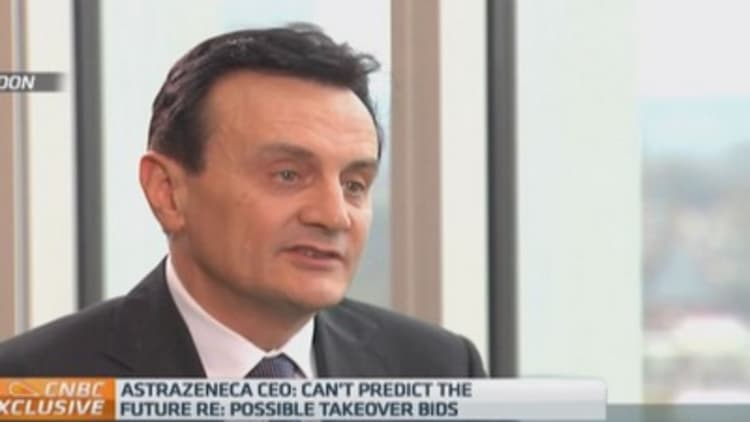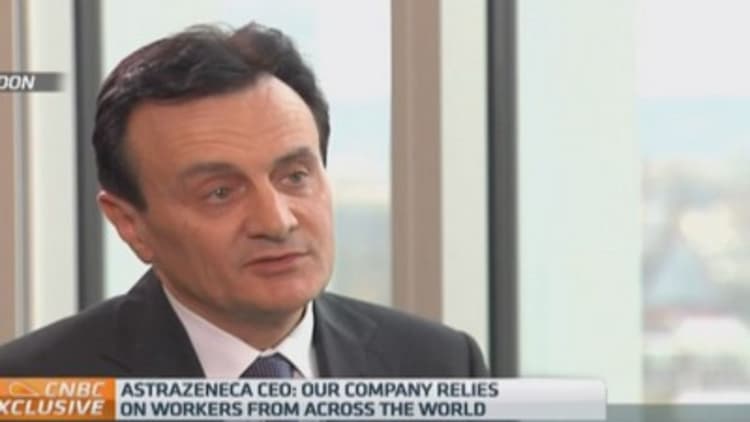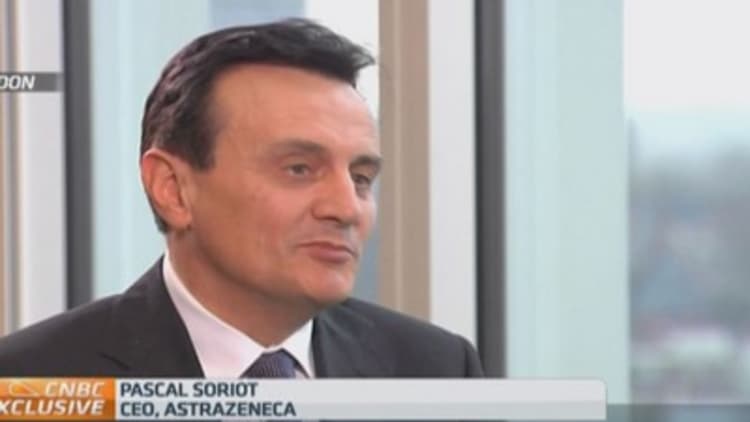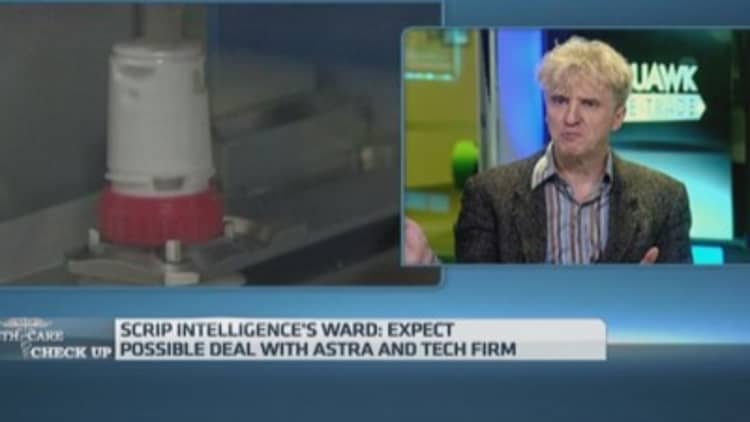Pfizer's attempt to gain control of U.K. pharmaceutical company AstraZeneca through a £69.4 billion ($110 billion) bid in May would have run aground on changes to U.S. tax inversion laws, the chief executive of AstraZeneca has told CNBC.
"We were worried about the tax inversion risk – in fact it has become a reality. If we had agreed to a deal at the time, probably that deal would have fallen apart by now, just like the AbbVie/Shire deal, and created enormous destruction and disruption in our company," Soriot told CNBC in an exclusive interview.
AbbVie's $54 billion offer for Shire was withdrawn in October after U.S. Treasury Secretary Jack Lew announced new rules aimed at stopping inversion-related deals. The controversial tax strategy involves companies moving their headquarters to another country to avoid paying U.S. tax on overseas income. Pfizer planned to move its corporate headquarters to the U.K. if it had been successful in its bid for AstraZeneca during the summer.
Read More AbbVie-Shire: Final nail in inversion coffin?
There has been some speculation Pfizer may come back with a further bid, after a cooling-off period imposed by the U.K.'s Takeover Panel expired on November 26. AstraZeneca's share price, which had been at around £37 per share before the first reports of a Pfizer approach emerged, closed at £47.20 on Thursday – still far below the £55 per share Pfizer originally put on the table.

'Can't predict'
"I really can't predict what's going to happen," Soriot said when asked about the prospect of a second bid. "The only thing I can say really is that this level of attention that the situation created has helped us, in a way, highlight the strengths of our pipeline and the progress we are making."
Some analysts have queried the AstraZeneca chief's plans to almost double 2014 sales to $45 billion by 2023, as some of these projected sales are based on medicines which have yet to be tested in large-scale clinical trials. Soriot described the targets as "ambitious but achievable."
When Pfizer launched its pursuit earlier in the year, FTSE 100 companyAstraZeneca suddenly shot to the top of the news agenda, as politicians on both sides of the Atlantic piled in to the bid process.

Since then, investor nervousness over political uncertainty in the U.K. has built, as anti-European Union party the U.K. Independence Party (UKIP) has built its support base, and the possibility that the U.K. may even leave the EU has been raised.
"I'm a European believer, so I'm not in favor of the UK stepping out of Europe," Soriot told CNBC.
"I think this is the direction of history and I'm a strong believer in Europe."
He emphasized the importance to AstraZeneca of attracting the best young graduates from all over the world, many of whom will work in its new built Cambridge headquarters.
Read MoreIn blow to PM Cameron, Britain's anti-EU UKIP party wins secondparliamentary seat
'Impossible not to be excited'
The movement of AstraZeneca's U.K. base from Manchester to Cambridge has raised eyebrows. "Relocating yourself and your family is never an easy thing to do," Soriot admitted.
"If you go to Cambridge, it's really hard not to be excited by the environment. If you're a scientist, it's almost impossible to not be excited."

The company has been steadily reducing its U.K. headcount, and currently employs around 6,700 people in the country. Under Soriot's predecessor David Brennan, global headcount was reduced by nearly 30,000 as the company tackled with expiring patents on blockbuster drugs. When patents expire, cheaper generic copies can enter the marketplace, often nearly eliminating sales of their more expensive counterparts.
AstraZeneca's sales figures have been helped this year by the inability of generic companies to produce an FDA-approved version of heartburn treatment Nexium (which has $3.87 billion in annual global sales for AstraZeneca).
Read MoreBack for more: Will Pfizer top its AstraZeneca bid?
"We are on a three-part journey," Soriot said. "We are now moving into the second part, 2016-17, where we are still going through transition, and dealing with the patent expiries of Nexium and Crestor, with the very strong underlying growth of the rest of the company. After this, the third part will be a period of very strong growth, as we launch our new products. We are building a very good company…a very different company."

Cancer treatment
One of the chief attractions to Pfizer was AstraZeneca's portfolio of cancer drugs, many of which were bought with the acquisition of U.S. company MedImmune.
"Cancer cells are very smart. They find ways to escape treatment," Soriot said.
"The new way to address that is to enrol the patient's immune system to kill the cancer cells. There are many ways to do this."
Read MoreAstraZeneca trumpets strength in drug development
Soriot himself, who was born in France and previously worked for French pharmaceuticals giant Sanofi-Aventis, has been one of the names mooted as a potential new chief executive of Sanofi, after the ousting of Chris Viehbacher. Asked if he wanted the job, he said: "I'm very committed to this company and to our agenda."


